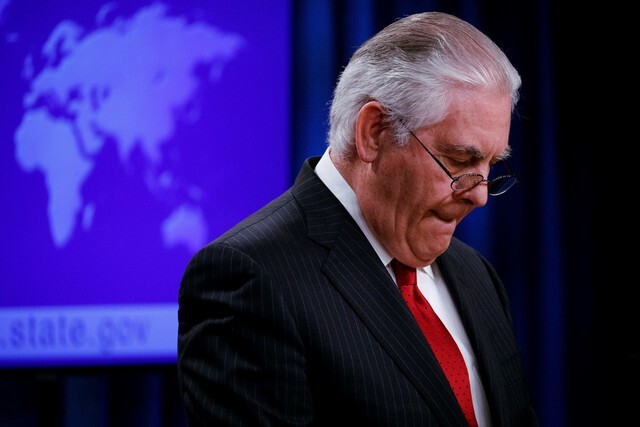hankyoreh
Links to other country sites 다른 나라 사이트 링크
[Correspondent’s Column] A bitter ending to Rex Tillerson’s short tenure as Secretary of State

Rex Tillerson made a bitter exit as US Secretary of State after receiving notice via Twitter from President Donald Trump on Mar. 13. Tillerson began work on Feb. 1, 2017, which means his term lasted just slightly over 13 months. Appearing as President-elect on “Fox News Sunday” on Dec. 11, 2016, Trump said his Secretary of State decision was “getting very, very close,” adding that he had “someone in mind that I think will be really fabulous.” When asked follow-up questions about Tillerson, Trump praised him as a “world class player.” But his “fabulous” and “world class” pick turned out to be a hopeless case.
At the time he named Tillerson, Trump may have been thinking of the “Shultz model” from the Ronald Reagan presidency. George Shultz served as Secretary of Labor and Secretary of the Treasury under the Richard Nixon administration before moving on to become vice president of the world-class construction and engineering company Bechtel, where he eventually became president on the strength of his achievements in winning big contracts.
After these eight active years as a businessman, Shultz was picked to become Secretary of State for the Reagan administration in 1982 following predecessor Alexander Haig’s abrupt resignation. Shultz ended up remaining in the position throughout the rest of Reagan’s presidency until Jan. 20, 1989. Respected by the State Department organization and deeply trusted by Reagan, Shultz was praised as an “administrative expert” and “one of the most respected Secretaries of State of the 20th century.”
Tillerson, a Texas native, went to work at Exxon in 1975. By 2006, he had risen to become CEO, a position he would hold for over 10 years. While he claims to have accepted the Secretary of State offer at his wife’s suggestion, he too may have viewed Shultz as a kind of role model.
Unfortunately, Tillerson ended up taking the exact opposite path from the Shultz model. He was unable to find the same “wavelength” as Trump. He failed to stop a 30% cut in the State Department budget, while incurring resentment from staffers with his cuts to senior positions.
Within the State Department, decisions were made by a select few associates. Unversed in North Korea issues, Tillerson initially took the advice of staffers who said the Secretary of State’s role lay in negotiating with Pyongyang rather than fighting with it. According to diplomatic sources, however, he would later pay little attention to what the staffers said.
With Tillerson’s departure, various US news outlets have called him “one of the worst Secretaries of State in history” and his performance “a disgrace that will last a generation of more.” An expert at one Washington think tank even blasted him as having “achieved his goal of lasting one year to avoid becoming the shortest-serving Secretary of State since World War II.” (Edmund Muskie was picked as Secretary of State under Jimmy Carter in May 1980, but left office when Carter failed to win re-election.)
But having witnessed his self-sacrificing attempts last year to stop the harsh war of words and rising tensions between Pyongyang and Washington, I feel sorry for him. Whatever his merits and demerits, he and Secretary of Defense James Mattis combined to play the role of “red team,” voicing a different message within the Trump administration.
Whether it’s the North Korean nuclear issue, Iran, or the Middle East, the red team’s role is all the more important in a situation like the current one, where the very game is changing. Apart from Mattis, however, Trump’s foreign affairs and national security team is now packed with loyalists. And when loyalists get together, they are prone to succumbing to groupthink.

The nomination of Central Intelligence Agency (CIA) director and Trump “confidant” Mike Pompeo as Secretary of State is not bad news. One of the main reasons the North Korean nuclear issue has not been resolved to date is the calculated caution of the Washington mainstream elite, which has resisted bold measures in favor of maintaining the current order. For all the hopes, however, there’s a sense of unease that can’t be fully erased.
By Yi Yong-in, Washington correspondent
Please direct questions or comments to [english@hani.co.kr]

Editorial・opinion
![[Column] Has Korea, too, crossed the Rubicon on China? [Column] Has Korea, too, crossed the Rubicon on China?](https://flexible.img.hani.co.kr/flexible/normal/500/300/imgdb/original/2024/0419/9317135153409185.jpg) [Column] Has Korea, too, crossed the Rubicon on China?
[Column] Has Korea, too, crossed the Rubicon on China?![[Correspondent’s column] In Japan’s alliance with US, echoes of its past alliances with UK [Correspondent’s column] In Japan’s alliance with US, echoes of its past alliances with UK](https://flexible.img.hani.co.kr/flexible/normal/500/300/imgdb/original/2024/0419/2317135166563519.jpg) [Correspondent’s column] In Japan’s alliance with US, echoes of its past alliances with UK
[Correspondent’s column] In Japan’s alliance with US, echoes of its past alliances with UK- [Editorial] Does Yoon think the Korean public is wrong?
- [Editorial] As it bolsters its alliance with US, Japan must be accountable for past
- [Guest essay] Amending the Constitution is Yoon’s key to leaving office in public’s good graces
- [Editorial] 10 years on, lessons of Sewol tragedy must never be forgotten
- [Column] A death blow to Korea’s prosecutor politics
- [Correspondent’s column] The US and the end of Japanese pacifism
- [Guest essay] How Korea turned its trainee doctors into monsters
- [Guest essay] As someone who helped forge Seoul-Moscow ties, their status today troubles me
Most viewed articles
- 1[Column] The clock is ticking for Korea’s first lady
- 2Hong Se-hwa, voice for tolerance whose memoir of exile touched a chord, dies at 76
- 3After 2 months of delayed, denied medical care, Koreans worry worst may be yet to come
- 4[Column] Has Korea, too, crossed the Rubicon on China?
- 5[Correspondent’s column] In Japan’s alliance with US, echoes of its past alliances with UK
- 6US overtakes China as Korea’s top export market, prompting trade sanction jitters
- 7Samsung barricades office as unionized workers strike for better conditions
- 8All eyes on Xiaomi after it pulls off EV that Apple couldn’t
- 9More South Koreans, particularly the young, are leaving their religions
- 10John Linton, descendant of US missionaries and naturalized Korean citizen, to lead PPP’s reform effo